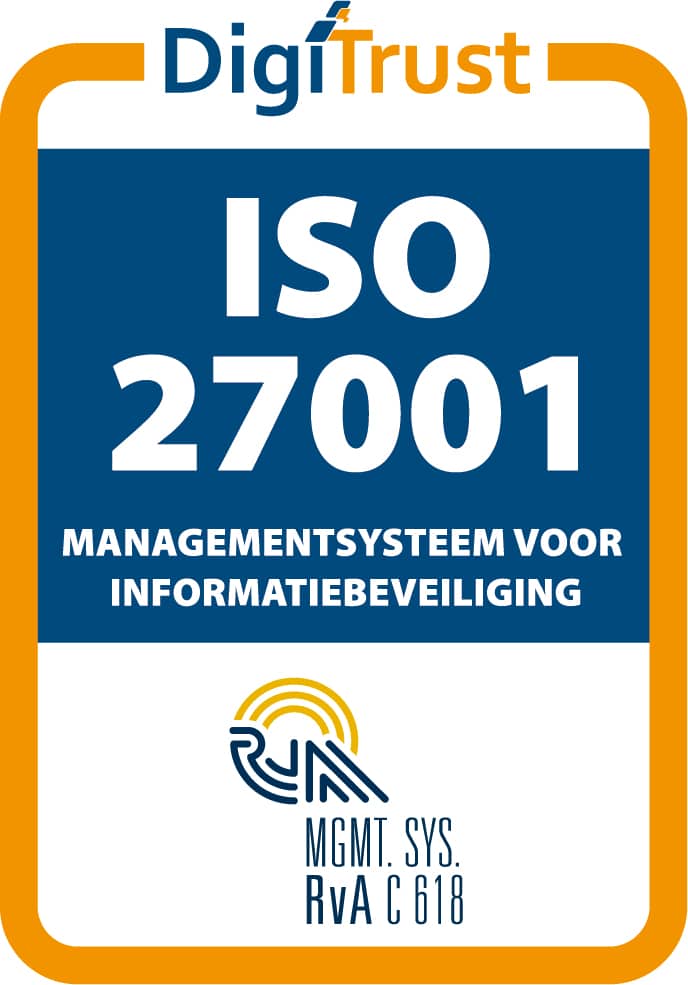Digital signature
A digital or electronic signature provides security and integrity
Types of signature
A digital signature or electronic signature is a digital version of a handwritten or wet signature and consists of digital data attached to a digital document. An electronic signature arranges assurance of the expression of will and identity of the signers and assurance that the signed document will not be altered again.
Three types of digital signatures
The Dutch law follows the European law (eIDAS) and has 3 types of electronic signatures:
- The ordinary digital signature
- The advanced digital signature
- The qualified digital signature
Ordinary electronic signature
A common, non-qualified electronic signature is a signature associated with other digital data, such as a document or an e-mail. This commonplace electronic signature serves to indicate the identity of the signer. Nevertheless, this variant of electronic signature possesses limited legal value since the actual identity of the signer cannot be verified. Moreover, this form of signature is extremely vulnerable to forgery, and subsequent modification of the content of the accompanying document is quite possible. An ordinary electronic signature includes, for example, a scanned handwritten signature or a signature created using a mouse (called a mouse signature).
Advanced electronic signature
De geavanceerde elektronische handtekening, onder specifieke voorwaarden, verleent volledige rechtsgeldigheid aan de te ondertekenen documenten. Een belangrijk voordeel van de geavanceerde elektronische handtekening in vergelijking met de gekwalificeerde elektronische handtekening is dat deze op een gebruiksvriendelijke wijze kan worden toegepast op de meeste te ondertekenen documenten, zonder afbreuk te doen aan hun juridische geldigheid. De afzender van het document kan niet alleen zelf digitaal ondertekenen, maar kan tevens zijn cliënten op een relatief eenvoudige manier digitaal laten ondertekenen binnen hetzelfde systeem, wat het volledige onderteken proces moeiteloos digitaal maakt.
Qualified electronic signature
The qualified digital or electronic signature is equivalent to the handwritten or wet signature. It therefore has the same legal value. The qualified electronic signature is created with a qualified personal PKI certificate. This signature is required for documents with significant legal consequences, such as notarial deeds, mortgage deeds, insurance policies and in some cases employment contracts. More about the qualified electronic signature.
Reliability of electronic signature
Legal validity says a lot about the reliability of electronic signatures. The advanced electronic signature and the qualified electronic signature can be considered reliable. With both types, you can assume that the signer is the one to sign (identity). And that the signed documents cannot be changed after signing (integrity). For the ordinary signature (for example, a mouse signature or a scanned image) this unfortunately does not apply. Therefore, it cannot be considered reliable.
Also see: The Central Government.
European use of digital signature
Sinds 23 juli 2014 bestaat de Europese verordening (EU) nr. 910/2014 die betrekking heeft op het gebruik van de digitale handtekening. Deze verordening borgt dat in alle EU landen dezelfde wetgeving t.a.v. elektronische handtekeningen geldt en dat alle EU landen elkaars elektronische handtekeningen erkennen. Het is ieder EU land wel toegestaan om hierop eigen aanvullende wetgeving toe te passen. In Nederland is dat de wet elektronische handtekening. Vergelijk het maar met het internationale gebruik van paspoorten. Elk land geeft zijn eigen paspoort uit. En volgens de eigen wetgeving. Deze paspoorten zijn per land verschillend maar worden wel door elk land geaccepteerd, omdat ze voldoen aan de internationale afspraken.
